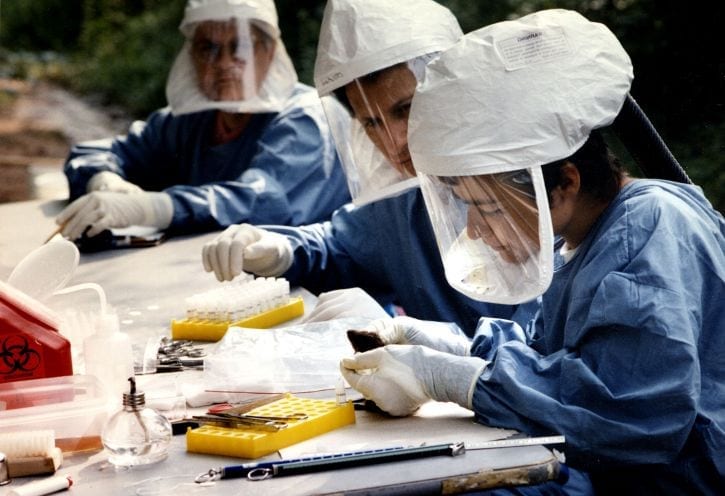What are hantaviruses?
Hantaviruses are a type of virus found in rodents in different parts of the world. Hantavirus infections were first identified in the southwestern U.S. in 1993. In recent years, sporadic cases have been found in several eastern states, including New York. Studies have shown that mice are often infected and appear to be the source of infection.
Is this illness common to humans?
No. Hantavirus infections are rare. No one believes the virus will start an epidemic, but sporadic or isolated cases may occur throughout the country.
How is the virus transmitted?
The virus is carried by rodents such as mice which are found throughout North America. Infected rodents shed the live virus in saliva, droppings and urine. Humans are infected when they inhale microscopic particles that contain rodent urine or droppings. Insect bites and pets are not believed to play a role in Hantavirus transmission.
Can people infect each other?
There is no evidence of person-to-person transmission. No health care workers have been infected while caring for infected persons.
What are the symptoms?
Typical symptoms include high fever, muscle aches, cough and headache. After several days, respiratory problems worsen rapidly. The lungs may fill with fluid and victims may die of respiratory failure.
How long does it take to develop symptoms after exposure?
Typically one to two weeks, but it may range from a few days up to six weeks.
Is there any treatment?
There is no specific treatment for Hantavirus. Physicians have been administering ribavirin, an antiviral drug, on an experimental basis to suspected victims.
Is the disease always fatal?
No. Although many of the cases have been fatal, a number have been mild.
What is the best way to prevent exposure to hantavirus?
Avoid contact with rodents. Since rodents are the primary means of transmitting these viruses, eliminating contact with them is the best way to avoid infection. Also, avoid contact with their droppings and urine. When cleaning up rodent droppings, wet them down first with a bleach solution and wear gloves.
What should be done to clean up after rodents?
Dwellings with large amounts of rodent droppings should first be aired out while unoccupied. It is essential to keep droppings from getting into the air where they can be inhaled. Scientists believe that people are exposed when they inhale contaminated material. The rodent debris should be thoroughly wet down with a household disinfectant solution (consisting of detergent plus 1 and 1/2 cups of bleach for each gallon of water) to reduce airborne dust. An old spray bottle is ideal for applying the solution. Debris should then be wiped up and placed in double plastic bags for disposal, together with any cleanup materials such as paper towels, etc. Do not use vacuum cleaners or sweep with brooms, which will create dust in the air. Use of gloves, dust mist masks, long-sleeved clothing and protective eyewear may help prevent personal exposure. Wash hands with soap and water after completing the cleanup. Rodent-proofing measures should be applied to dwellings to prevent animal entry. Consult an exterminator or your local health department for additional information on rodent control.
Should I set traps to catch the mice?
Yes, but use precautions. Wear gloves. If snap traps are used, the trap should be discarded along with the dead rodent. Direct contact with the animal and its droppings should be avoided. After eliminating rodents from a building, the conditions that attracted them there (improperly stored food sources, rubbish, etc.) should be corrected.
Will the ‘fume bombs’ sold over-the-counter kill the virus?
Probably not. The virus is best inactivated by contact with the liquid disinfectant such as the detergent and household bleach solution described above.
Where can I get more information?
If you are seriously ill with a high fever, consult a doctor or local emergency room immediately. For general information, call your local or state health department.






Be the first to comment on "Hantavirus Infections (Hantavirus Pulmonary Syndrome)"